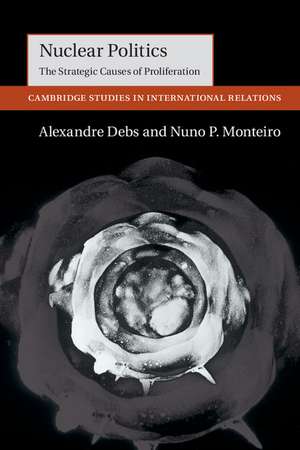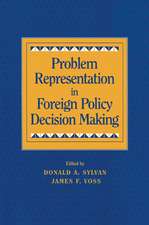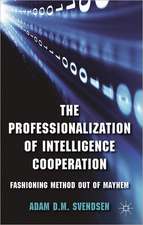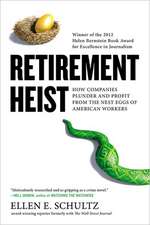Nuclear Politics: The Strategic Causes of Proliferation: Cambridge Studies in International Relations, cartea 142
Autor Alexandre Debs, Nuno P. Monteiroen Limba Engleză Paperback – 14 dec 2016
| Toate formatele și edițiile | Preț | Express |
|---|---|---|
| Paperback (1) | 287.76 lei 43-57 zile | |
| Cambridge University Press – 14 dec 2016 | 287.76 lei 43-57 zile | |
| Hardback (1) | 695.99 lei 43-57 zile | |
| Cambridge University Press – 14 dec 2016 | 695.99 lei 43-57 zile |
Din seria Cambridge Studies in International Relations
-
 Preț: 200.85 lei
Preț: 200.85 lei -
 Preț: 232.37 lei
Preț: 232.37 lei -
 Preț: 237.58 lei
Preț: 237.58 lei -
 Preț: 198.89 lei
Preț: 198.89 lei -
 Preț: 210.69 lei
Preț: 210.69 lei -
 Preț: 190.01 lei
Preț: 190.01 lei -
 Preț: 200.78 lei
Preț: 200.78 lei - 8%
 Preț: 401.23 lei
Preț: 401.23 lei -
 Preț: 229.56 lei
Preț: 229.56 lei -
 Preț: 265.70 lei
Preț: 265.70 lei -
 Preț: 200.08 lei
Preț: 200.08 lei -
 Preț: 207.81 lei
Preț: 207.81 lei -
 Preț: 158.77 lei
Preț: 158.77 lei -
 Preț: 162.49 lei
Preț: 162.49 lei -
 Preț: 231.47 lei
Preț: 231.47 lei - 11%
 Preț: 584.77 lei
Preț: 584.77 lei -
 Preț: 241.77 lei
Preț: 241.77 lei -
 Preț: 287.87 lei
Preț: 287.87 lei -
 Preț: 209.12 lei
Preț: 209.12 lei -
 Preț: 299.22 lei
Preț: 299.22 lei -
 Preț: 286.13 lei
Preț: 286.13 lei -
 Preț: 287.87 lei
Preț: 287.87 lei - 11%
 Preț: 641.67 lei
Preț: 641.67 lei - 11%
 Preț: 585.78 lei
Preț: 585.78 lei - 14%
 Preț: 843.23 lei
Preț: 843.23 lei -
 Preț: 303.80 lei
Preț: 303.80 lei -
 Preț: 284.78 lei
Preț: 284.78 lei -
 Preț: 279.76 lei
Preț: 279.76 lei -
 Preț: 285.75 lei
Preț: 285.75 lei -
 Preț: 324.24 lei
Preț: 324.24 lei -
 Preț: 290.16 lei
Preț: 290.16 lei -
 Preț: 291.69 lei
Preț: 291.69 lei -
 Preț: 392.52 lei
Preț: 392.52 lei -
 Preț: 315.99 lei
Preț: 315.99 lei
Preț: 287.76 lei
Nou
Puncte Express: 432
Preț estimativ în valută:
55.06€ • 57.64$ • 45.56£
55.06€ • 57.64$ • 45.56£
Carte tipărită la comandă
Livrare economică 07-21 aprilie
Preluare comenzi: 021 569.72.76
Specificații
ISBN-13: 9781107518575
ISBN-10: 1107518571
Pagini: 648
Dimensiuni: 152 x 228 x 35 mm
Greutate: 0.87 kg
Editura: Cambridge University Press
Colecția Cambridge University Press
Seria Cambridge Studies in International Relations
Locul publicării:New York, United States
ISBN-10: 1107518571
Pagini: 648
Dimensiuni: 152 x 228 x 35 mm
Greutate: 0.87 kg
Editura: Cambridge University Press
Colecția Cambridge University Press
Seria Cambridge Studies in International Relations
Locul publicării:New York, United States
Cuprins
Figures and tables; Abbreviations and acronyms; Preface; 1. Introduction; 2. A strategic theory of nuclear proliferation; 3. The historical patterns of nuclear proliferation; 4. Adversaries and proliferation; 5. Loose allies and proliferation; 6. Close allies and proliferation; 7. Conclusion; Appendix 1. Coding rules; Appendix 2. Other cases of nuclear development; Appendix 3. Puzzling cases of no nuclear development; Appendix 4. Formal theory; Bibliography; Index.
Recenzii
'This impressive book is a model of judicious scholarship and a landmark in the study of nuclear proliferation. Focusing on the strategic interactions between would-be proliferators, their adversaries, and their allies, Debs and Monteiro present a simple and powerful theory explaining why some states seek the bomb while others choose to forego it. The logic of their argument is straightforward and the evidence they present is compelling. No one interested in strategy, security, or the role of nuclear weapons can afford to ignore this work.' Stephen Walt, Robert and Renée Belfer Professor of International Affairs, Harvard Kennedy School, Harvard University, Massachusetts
'Nuclear Politics is an important book. Debs and Monteiro show that the spread of nuclear weapons is best understood as a three-way strategic interaction between a government contemplating getting the bomb, its adversaries considering how best to stop such acquisition, and its allies calculating whether to coerce or threaten to abandon the ally, to offer renewed security assurances, or to acquiesce in its nuclear proliferation. The authors combine stunningly clear analytic logic with rich historical case studies to produce a major work of social science that should be read by political scientists, historians, and policymakers.' Scott Sagan, Caroline S. G. Munro Professor of Political Science, Stanford University, California
'Nuclear Politics marks an important step forward in our understanding of nuclear proliferation. Focusing explicitly on the strategic interaction between the potential proliferator and its allies and adversaries, the book accounts for patterns of proliferation that no other approach has been able to explain. We see for example why even though nuclear weapons are often described as the 'weapons of the weak', weak states that also lack cover from a great power are unlikely to develop nuclear weapons and, indeed, historically never have.' Robert L. Powell, Robson Professor of Political Science, University of California, Berkeley
'Nuclear Politics significantly advances our understanding of nuclear proliferation by applying a penetrating analytic lens to this critical topic. Debs and Monteiro develop a theory of strategic interaction between the potential proliferator, its adversaries and its allies. Their theory integrates existing insights about the causes of proliferation, demonstrating how they are related to and intertwined with each other; and it gives new prominence to underappreciated features of the potential proliferator's strategic environment, including the possibility that preventive attacks convince states not to acquire nuclear weapons. The book provides impressive empirical support for its theoretical insights.' Charles L. Glaser, Director, Institute for Security and Conflict Studies, Elliott School of International Affairs, George Washington University
'Why have we seen surprisingly few nations obtain the bomb since Hiroshima? Alexandre Debs and Nuno Monteiro provide the most powerful answer to this question yet. Blending painstaking empirical research with a robust theoretical architecture, they show that the major nuclear powers, above all the US, have long deployed ruthless - and effective - policies of nonproliferation, not out of some selfless idealism but because states with bombs threaten their preponderance. The strategic conditions established by these policies, Debs and Monteiro demonstrate, make it relatively uncommon for a nation to be both willing and able to go for the bomb. This elegantly written book provides both authoritative scholarly analysis and a clear blueprint for future US nonproliferation efforts.' Campbell Craig, Cardiff University, and co-author of America's Cold War
'Nuclear Politics is an important book. Debs and Monteiro show that the spread of nuclear weapons is best understood as a three-way strategic interaction between a government contemplating getting the bomb, its adversaries considering how best to stop such acquisition, and its allies calculating whether to coerce or threaten to abandon the ally, to offer renewed security assurances, or to acquiesce in its nuclear proliferation. The authors combine stunningly clear analytic logic with rich historical case studies to produce a major work of social science that should be read by political scientists, historians, and policymakers.' Scott Sagan, Caroline S. G. Munro Professor of Political Science, Stanford University, California
'Nuclear Politics marks an important step forward in our understanding of nuclear proliferation. Focusing explicitly on the strategic interaction between the potential proliferator and its allies and adversaries, the book accounts for patterns of proliferation that no other approach has been able to explain. We see for example why even though nuclear weapons are often described as the 'weapons of the weak', weak states that also lack cover from a great power are unlikely to develop nuclear weapons and, indeed, historically never have.' Robert L. Powell, Robson Professor of Political Science, University of California, Berkeley
'Nuclear Politics significantly advances our understanding of nuclear proliferation by applying a penetrating analytic lens to this critical topic. Debs and Monteiro develop a theory of strategic interaction between the potential proliferator, its adversaries and its allies. Their theory integrates existing insights about the causes of proliferation, demonstrating how they are related to and intertwined with each other; and it gives new prominence to underappreciated features of the potential proliferator's strategic environment, including the possibility that preventive attacks convince states not to acquire nuclear weapons. The book provides impressive empirical support for its theoretical insights.' Charles L. Glaser, Director, Institute for Security and Conflict Studies, Elliott School of International Affairs, George Washington University
'Why have we seen surprisingly few nations obtain the bomb since Hiroshima? Alexandre Debs and Nuno Monteiro provide the most powerful answer to this question yet. Blending painstaking empirical research with a robust theoretical architecture, they show that the major nuclear powers, above all the US, have long deployed ruthless - and effective - policies of nonproliferation, not out of some selfless idealism but because states with bombs threaten their preponderance. The strategic conditions established by these policies, Debs and Monteiro demonstrate, make it relatively uncommon for a nation to be both willing and able to go for the bomb. This elegantly written book provides both authoritative scholarly analysis and a clear blueprint for future US nonproliferation efforts.' Campbell Craig, Cardiff University, and co-author of America's Cold War
Notă biografică
Descriere
A comprehensive theory of the causes of nuclear proliferation, alongside an in-depth analysis of sixteen historical cases of nuclear development.
















